

Facebook. Why Climate Deniers Have No Scientific Credibility: Only 1 of 9,136 Recent Peer-Reviewed Authors Rejects Global Warming. The Coming ‘Instant Planetary Emergency’ Waves wash over a roller coaster from a Seaside Heights, New Jersey, amusement park that fell in the Atlantic Ocean during Superstorm Sandy.
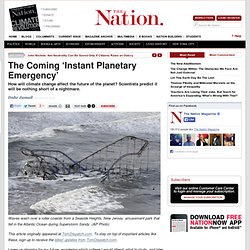
(AP Photo) This article originally appeared at TomDispatch.com. To stay on top of important articles like these, sign up to receive the latest updates from TomDispatch.com. I grew up planning for my future, wondering which college I would attend, what to study, and later on, where to work, which articles to write, what my next book might be, how to pay a mortgage, and which mountaineering trip I might like to take next. 'Missing heat' discovery prompts new estimate of global warming: Arctic warming fast. An interdisciplinary team of researchers say they have found 'missing heat' in the climate system, casting doubt on suggestions that global warming has slowed or stopped over the past decade.
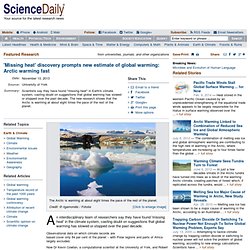
Observational data on which climate records are based cover only 84 per cent of the planet -- with Polar regions and parts of Africa largely excluded. Now Dr Kevin Cowtan, a computational scientist at the University of York, and Robert Way, a cryosphere specialist and PhD student at the University of Ottawa, have reconstructed the 'missing' global temperatures using a combination of observations from satellites and surface data from weather stations and ships on the peripheries of the unsampled regions. The new research published in the Quarterly Journal of the Royal Meteorological Society shows that the Arctic is warming at about eight times the pace of the rest of the planet.
Preparing for hell and high water: Researchers advocate for climate adaptation science. Changes are already happening to Earth's climate due to the burning of fossil fuels, deforestation and large-scale agriculture.
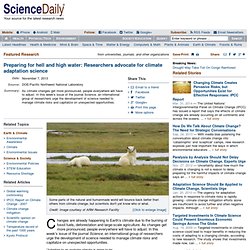
As changes get more pronounced, people everywhere will have to adjust. In this week's issue of the journal Science, an international group of researchers urge the development of science needed to manage climate risks and capitalize on unexpected opportunities. "Adapting to an evolving climate is going to be required in every sector of society, in every region of the globe. We need to get going, to provide integrated science if we are going to meet the challenge," said senior scientist Richard Moss of the Department of Energy's Pacific Northwest National Laboratory. "In this article, we describe the foundations for this research and suggest measures to establish it.
" Climate preparedness research needs to integrate social and climate science, engineering, and other disciplines. Tropical ocean key to global warming ‘hiatus’ Extreme weather such as that seen in Salinas, California, in 1998 is not the only consequence of the El Niño-La Niña cycle: another one could be a slow-down in the rise of global temperatures.
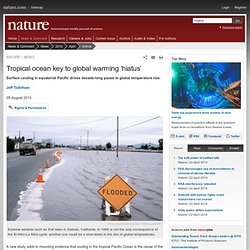
A new study adds to mounting evidence that cooling in the tropical Pacific Ocean is the cause of the global warming hiatus, a slow-down in the rise of average temperatures that began around 1998. The eastern equatorial Pacific is well known to have an outsize influence on global weather. Years-long ocean trends such as El Niño and La Niña cause alternate warming and cooling of the sea surface there, with effects on monsoons and temperatures around the world. Now a modelling study by researchers at the Scripps Institution of Oceanography in La Jolla, California, indicates that a decadal La Niña-like cooling trend affecting as little as 8% of Earth’s surface can explain the slower rise in global temperatures.
Hot topic. Here Are 2 Ways We Now Know the Fracking Boom Is Causing Earthquakes - Jordan Weissmann. Researchers already knew part of the fracking process was causing the ground shake.
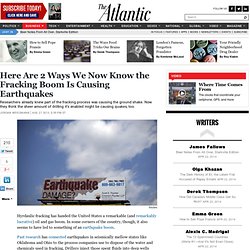
Now they think the sheer amount of drilling it's enabled might be causing quakes, too. Hyrdaulic fracking has handed the United States a remarkable (and remarkably lucrative) oil and gas boom. In some corners of the country, though, it also seems to have led to something of an earthquake boom. Fracking Blamed For Widespread Death Of Federally-Protected Fish In Kentucky. Brain region distribution and patterns of bioaccumulative perfluoroalkyl carboxylates and sulfonates in East Greenland polar bears (Ursus maritimus) - Greaves - 2013 - Environmental Toxicology and Chemistry. Global warming is real, and it’s our fault — let’s fix it. EDITORIALS August 20, 2013 5:20PM storyidforme: 53814643 tmspicid: 19835014 fileheaderid: 9082689 Updated: September 22, 2013 6:25AM.
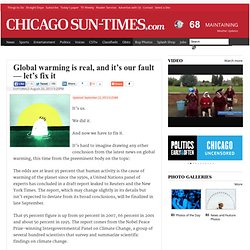
IPCC Surer Than Ever About Human-Caused Climate Change. But the international panel of experts is less sure how that will affect people in specific places. Coal Plant A Intermountain Power Project coal-burning plant in Utah Utah Geological Survey What debate ? Increased flooding may cost the world $1 trillion by 2050. Flood damage in the world's major coastal cities may top $1 trillion a year by 2050 due to rising seas and subsiding land, according to a new study.
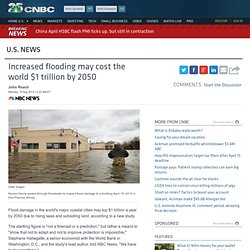
The startling figure is "not a forecast or a prediction," but rather a means to "show that not to adapt and not to improve protection is impossible," Stéphane Hallegatte, a senior economist with the World Bank in Washington, D.C., and the study's lead author, told NBC News. "We have to do something. " The finding, which comes nearly 10 months after Superstorm Sandy's destruction, is shared by Hallegatte and colleagues in a report Sunday in the journal Nature Climate Change.
Researchers considered current flood protections in 136 cities around the world, and found that in many instances they are inappropriate for sea levels that rise a projected 8 inches by the year 2050. Imagining The Submerged California Coast After The Sea Level Rises. Artist and researcher Nickolay Lam has created visions of Boston’s Back Bay inundated, a sunken Statue of Liberty, and the Thomas Jefferson memorial submerged.

He began creating images of flooded cities with real sea level rise projections earlier this year--and now he has taken on the California coast. This Tiny Alaskan Village Will Be Underwater In Just 10 Years. Kivalina is an eight-mile spit of barrier reef located 70 miles north of the Arctic Circle that roughly 400 people of Inupiat Eskimo descent call home.
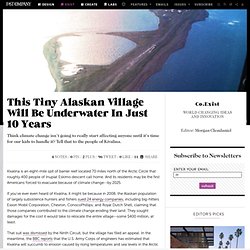
And its residents may be the first Americans forced to evacuate because of climate change--by 2025. If you’ve ever even heard of Kivalina, it might be because in 2008, the Alaskan population of largely subsistence hunters and fishers sued 24 energy companies, including big-hitters Exxon Mobil Corporation, Chevron, ConocoPhillips, and Royal Dutch Shell, claiming that those companies contributed to the climate change eroding their land. They sought damages for the cost it would take to relocate the entire village--some $400 million, at least. That suit was dismissed by the Ninth Circuit, but the village has filed an appeal. In the meantime, the BBC reports that the U.S. The U.S. The rapid, disturbing disappearance of Arctic sea ice has been linked to everything from to altered jet stream currents, which impact weather in extreme ways.
A Sinking Village Trying To Escape Climate Change Is Stuck In A Quagmire. Experts Surer Than Ever of Manmade Global Warming. Oslo.

Climate scientists are surer than ever that human activity is causing global warming, according to leaked drafts of a major UN report, but they are finding it harder than expected to predict the impact in specific regions in coming decades. The uncertainty is frustrating for government planners: the report by the Intergovernmental Panel on Climate Change (IPCC) is the main guide for states weighing multibillion-dollar shifts to renewable energy from fossil fuels, for coastal regions considering extra sea defenses or crop breeders developing heat-resistant strains. Drafts seen by Reuters of the study by the UN panel of experts, due to be published next month, say it is at least 95 percent likely that human activities – chiefly the burning of fossil fuels – are the main cause of warming since the 1950s. That shifts the debate onto the extent of temperature rises and the likely impacts, from manageable to catastrophic.
Why Climate Deniers Have No Scientific Credibility - In One Pie Chart. Deaths of Manatees, Dolphins and Pelicans Point to Estuary at Risk. Starved polar bear perished due to record sea-ice melt, says expert. This 16-year-old male polar bear died of starvation resulting from the lack of ice on which to hunt seals. Photograph: Ashley Cooper/Global Warming Images. North Pole lake just vanishes. Two newly published studies are helping scientists trace millions of years of Antarctica's climate history, including an age when parts of the continent were as warm as the California coast is today.
One of the studies focuses on an ice core taken from Antarctica's Taylor Glacier, and uses readings of radioactive krypton to confirm that the sample goes back 120,000 years. The researchers behind that study, appearing in the Proceedings of the National Academy of Sciences, say the same technique could provide more accurate dates for ice samples going back as far as 1.5 million years. How to talk to a conservative about climate change. Our climate change debate is stuck in a “left-wing ghetto.” That was one provocative conclusion reached during a high-level panel of politicians, environmental thinkers, journalists and business people in London, England.
“[Twenty] years of ‘awareness raising,’ grandiose pleas to save the planet, lots of talk about sacrifice, apocalyptic messages and photos of polar bears,” a recent summary report explained, “have trapped climate change in a niche that it urgently needs to break out of.” Recent polling numbers support the panel’s claims. Less than half of Britons firmly believe human activities are causing climate change, Angus Reid data from this spring suggested.
The figures were similar for Americans. Only 58 per cent of Canadian respondents agreed “global warming is a fact and is mostly caused by emissions from vehicles and industrial facilities” — even though 97 per cent of climate scientists believe that to be true. Why We Can't Count on Evolution to Counterbalance Climate Change. North Pole Melting Leaves Small Lake At The Top Of The World. Climate change: Oh, it's real. Beef-cuts-of-co2_517e32cf629fb.jpg (JPEG Image, 1024 × 662 pixels) - Scaled (89. Does Climate Change Mean More Polar-Grizzly Bear Hybrids? It's been a rough half-million years for the polar bear, so it sure doesn't help that man-made climate change is driving them toward extinction. According to a model published recently in PNAS, polar bears prospered during cool periods but struggled during warm ones, and their numbers have been declining since an exceptionally balmy period starting 420,000 years ago.
That's bad news (bears) with climate change now melting Arctic ice at unprecedented rates. 119 One-Liners to Respond to Climate Science Myths. Livestock and Climate Change.pdf (application/pdf Object) Humane Myth: Global Warming & Sustainability: Vegetarian is the New Prius. Last month, the United Nations published a report on livestock and the environment with a stunning conclusion: "The livestock sector emerges as one of the top two or three most significant contributors to the most serious environmental problems, at every scale from local to global.
" It turns out that raising animals for food is a primary cause of land degradation, air pollution, water shortage, water pollution, loss of biodiversity, and not least of all, global warming. That's right, global warming. You've probably heard the story: emissions of greenhouse gases like carbon dioxide are changing our climate, and scientists warn of more extreme weather, coastal flooding, spreading disease, and mass extinctions.
Science Says: Climate Change Stress Is Crippling Our Forests. Half of the planet’s animals, birds, and insects make their homes in forests, which cover 30 percent of our blue-green planet. Forests provide jobs and livelihoods for 400 million of the world’s people. Across the globe, forests and their soils absorb a quarter of all manmade carbon emissions. Arctic Sea Ice: What, Why and What Next. Arctic Warming is Altering Weather Patterns, Study Shows. EDITOR'S NOTE: This story was originally published April 3. Given recent news that Arctic sea ice set a record low, it's a reminder that changes in the Arctic can affect the U.S. and Europe. Arctic expert predicts final collapse of sea ice within four years.
Prof Peter Wadhams calls for “urgent” consideration of new ideas to reduce global temperatures. Greenland glacier: Before/after pics. Global Warming : Feature Articles. Blog. Climate - jalwerdt - University of South Florida Mail. Intergovernmental Panel on Climate Change. Climate Change Facts: Answers to Common Questions. This page answers some of the most commonly asked questions about climate change and its impacts. Explore more questions using our Frequently Asked Questions Database. Carbon Dioxide Information Analysis Center (CDIAC) Global Warming and Climate Change skepticism examined. Climate change challenge summary. Climate change: A guide for the perplexed - environment - 16 May 2007. Our planet's climate is anything but simple. Oceanservice.noaa.gov/education/literacy/climate_literacy.pdf. The Q&A: James Balog: Disappearing ice.